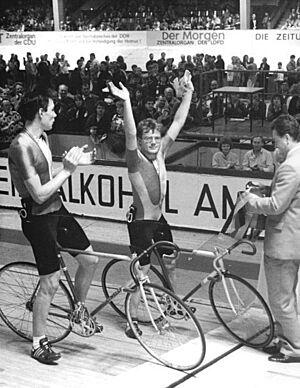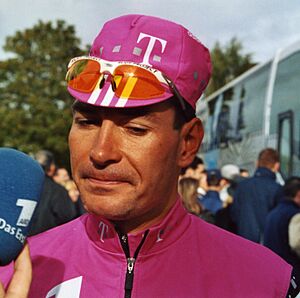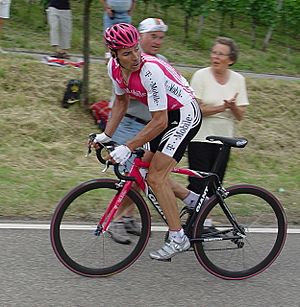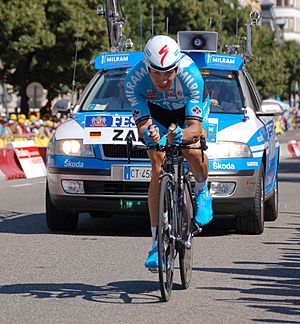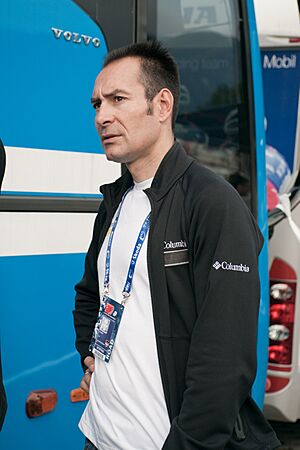Erik Zabel facts for kids
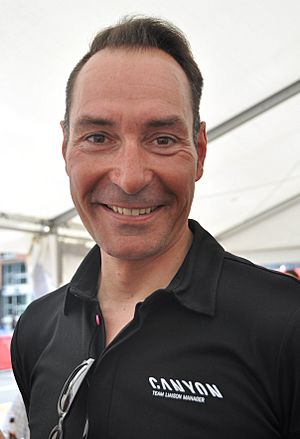
Zabel at the 2017 Rund um Köln
|
|||
| Personal information | |||
|---|---|---|---|
| Full name | Erik Zabel | ||
| Nickname | Ete | ||
| Born | 7 July 1970 East Berlin, East Germany |
||
| Height | 1.76 m (5 ft 9+1⁄2 in) | ||
| Weight | 69 kg (152 lb; 10 st 12 lb) | ||
| Team information | |||
| Major wins | |||
|
|||
Erik Zabel (born 7 July 1970) is a famous German former professional road bicycle racer. He rode for Team Telekom for most of his career. Many people think he is one of the best German cyclists and cycling sprinters ever. He won 152 professional races.
Zabel won a record nine points classifications in major cycling races called Grand Tours. This includes the points classification in the Tour de France six times in a row from 1996 to 2001. He also won the points classification in the Vuelta a España in 2002, 2003, and 2004. Zabel won the Milan–San Remo race four times. He also won many six-day track events. He was known for racing all year, even doing track cycling in winter. Erik Zabel is the father of cyclist Rick Zabel.
Early Life and Amateur Cycling
Erik Zabel grew up in East Berlin, Germany. His father, Detlev, was also a professional cyclist. Erik's first big success as a young rider was at the track world championship. He finished third in the team pursuit with the East German team. In 1988, he placed fifth in the points race. In 1989, at 19, he joined the East German national track team for professionals. That year, he became the national champion of East Germany in the individual pursuit.
After the Fall of the Berlin Wall, he moved to Dortmund. He joined the amateur team RC Olympia Dortmund. In 1991, he was second at the first national road championship of a united Germany. He also won the regional championship of North Rhine-Westphalia. He was then chosen for the amateur German team for the World Championship. In 1992, he became known as a strong sprinter. He won the green jersey in the Peace Race and several stages in other races. In July, he finished fourth in the road race at the 1992 Olympic Games in Barcelona. He won the sprint of the main group of riders there.
Professional Cycling Career
Starting Out: 1993–1995
In late 1992, Erik Zabel became a professional cyclist. He first rode for a small German team, Union-Frondenberg. In 1993, he moved to Team Telekom. This is where he really grew as a sprinter. In 1994, he won Paris–Tours. This was his first victory in a major one-day race, known as a classic.
In 1995, he won two stages in the Tour de France. These were his first big wins in a Grand Tour.
Winning Green Jerseys and Classics: 1996–1999
In 1996, Zabel won two more stages in the Tour de France. He also won the points classification, which earns the rider the green jersey. He wore the green jersey from stage 10 until the end of the Tour. That year, his Telekom team also had riders finish first and second overall.
In 1997, Zabel won his first "monument classic" race, Milan–San Remo. He was the only sprinter in a large group to reach the finish line. He easily won the sprint. Later that year, he won three stages in the Tour de France. He also secured his second green jersey.
In 1998, he won Milan–San Remo for the second time. He also became the national road champion of Germany. He won his third green jersey in the Tour de France, even without winning a stage.
In 1999, he finished second in Milan–San Remo. He won the sprint of the main group, but another rider had already broken away. He won the important German race Rund um den Henninger Turm in Frankfurt. He also won his fourth green jersey in a row at the Tour de France. This tied the record set by Sean Kelly.
World Number One: 2000–2002
In 2000, Zabel won two big races in the spring. He won Milan–San Remo for the third time. He also had a surprising win at the Amstel Gold Race. He beat Michael Boogerd in a group sprint. In the summer, he won an amazing fifth green jersey at the Tour de France. This broke Kelly's record. By the end of the year, he was the best overall in the World Cup. He was also ranked number two in the world.
In 2001, he won Milan–San Remo for the fourth time. This was the most wins since the cycling legend Eddy Merckx. People in Italy started calling him Signore Milano-Sanremo (Mr. Milan-San Remo). He won the points classification in the Tour de France for the sixth time in a row. He also won three stages. Zabel's amazing streak of six green jerseys was because he was a great all-around rider. He was one of the strongest sprinters. He could also climb hills quite well. This meant he could win stages and keep the green jersey. One memorable win was in the 2001 Tour de France. His competition with Australian Stuart O'Grady lasted until the very last stage in Paris. Zabel's better finish took the green jersey from O'Grady. Later that summer, he won the HEW Cyclassics. This was Germany's biggest one-day classic race. It was his seventh World Cup race win. In September, he won three stages in a row in the Vuelta a España. He also finished fifth in the World Championship road race.
The year 2001 was his most successful ever. He won 29 races and was ranked number one in the world.
In 2002, he missed the main group in Milan–San Remo. But he won Rund um den Henninger Turm for the second time. In the summer, he did not win a seventh green jersey in the Tour de France. He won one stage, his twelfth overall. But Australian Robbie McEwen beat him in the points classification. Instead, he won the points classification in the Vuelta a España. He did this without winning a stage. In Zolder, Belgium, he finished third at the World Championship. He was behind Mario Cipollini and Robbie McEwen in a group sprint. By the end of the year, he was still ranked number one in the world.
Vuelta Success and Podium Finishes: 2003–2005
In 2003, Zabel became the national road champion of Germany for the second time. However, he did not win a stage in the Tour de France. He finished third in the points classification. He won two stages in the Vuelta a España. He also won the points classification of that race again. In October, he won Paris–Tours for the second time. He set a record for the fastest average speed in a one-day race. He ended the year ranked number two in the world.
In 2004, Zabel almost won his fifth Milan–San Remo. He celebrated too early and Óscar Freire passed him at the very end. He was third in the Tour de France points classification. He was first in the Vuelta a España points classification. This was his ninth points classification win in a Grand Tour, which is a record. At the 2004 Olympics in Athens, he was fourth in the road race again. He won the sprint of the main group but missed an Olympic medal. By the end of the year, he was second in the world championship in Verona.
In 2005, Zabel became the first rider to win Rund um den Henninger-Turm in Frankfurt three times. This was his first win of the season. In May, he rode the Giro d'Italia for the first time. He wanted to win the points classification there, but he did not win a stage. His team, T-Mobile, decided not to pick him for the Tour de France that year. Zabel was not happy about this. He rode the Vuelta, but could not win a stage or the points classification. In October, he won Paris–Tours for the third time. This tied the record for wins in that classic race.
Team Milram and Retirement: 2006–2008
At 35, Zabel left Team Telekom after 13 years. In 2006, he joined the Italian-German team Milram. He teamed up with Alessandro Petacchi, who was considered the fastest sprinter. Petacchi got injured, so Zabel became the team leader. He won a stage in the Bayern Rundfahrt. In the Tour, he was second in the points classification. He won two stages in the Vuelta a España. In Salzburg, he finished second at the world championship. This was his third time on the podium at the world championships.
In 2007, he won two stages in the Bayern Rundfahrt and one in the Tour de Suisse. He was again the captain for the Tour de France team. He wore the green jersey for one day. He finished second twice and third once in stages. He was third in the final points classification. In July, he won a stage in the Deutschland Tour. This was his 13th stage win there. He also won the race's points classification for the seventh time. In September, he won the seventh stage in the Tour of Spain. This brought his total Vuelta stage wins to eight.
In 2008, he won one race, a stage in the Tour of Valencia. In his last Tour de France, at age 38, he was third in the points classification. In September 2008, Erik Zabel announced he would retire the next month. He had been a professional cyclist for 16 years. He had 209 professional road victories and many more podium finishes. In December 2008, he joined the Columbia team as an advisor. He worked with riders like Mark Cavendish and André Greipel.
Major Results
Road Cycling Achievements
- 1992
- 1st Stage 9 Peace Race
- 4th Road race, Olympic Games
- 1993
- 1st Tour de Berne
- 1st
 Points classification, Vuelta a Burgos
Points classification, Vuelta a Burgos - 7th Overall Tirreno–Adriatico
- 1st Stage 1
- 8th Road race, National Road Championships
- 10th Overall Settimana Ciclistica Internazionale
- 1994
- 1st Paris–Tours
- 1st Classic Haribo
- Tour de l'Avenir
- 1st Stages 2, 5, 7 & 8
- Vuelta a Aragón
- 1st Stages 2, 3 & 5
- 7th Omloop Het Volk
- 10th Japan Cup
- 1995
- Tour de France
- 1st Stages 6 & 17
- Tour de Suisse
- 1st Stages 2 & 3
- 1st Stage 1 Tirreno–Adriatico
- 1st Stage 2 Vuelta a Aragón
- 3rd Overall Four Days of Dunkirk
- 1st Stages 1 & 7
- 4th Dwars door België
- 7th Road race, National Road Championships
- 7th Overall Vuelta a Andalucía
- 8th Gent–Wevelgem
- 9th Scheldeprijs
- 1996
- 1st Rund um Köln
- Tour de France
- Setmana Catalana de Ciclisme
- 1st Stage 2 Four Days of Dunkirk
- 1st Stage 2 Tour de Luxembourg
- 1st Stage 3 Vuelta a Andalucía
- 1st Stage 5 Ronde van Nederland
- 5th Scheldeprijs
- 6th Rund um den Henninger Turm
- 7th Road race, National Road Championships
- 8th Telekom Grand Prix (with Jens Heppner)
- 1997
- 1st
 Overall Vuelta a Andalucía
Overall Vuelta a Andalucía
- 1st Stage 1
- 1st Milan–San Remo
- 1st Scheldeprijs
- 1st Trofeo Luis Puig
- 1st Trofeo Palma de Mallorca
- Tour de France
- 1st Stage 1 Tour de Suisse
- 1st Stage 1 Tour de Luxembourg
- 1st Stage 3 Volta a la Comunitat Valenciana
- 1st Stage 4 Ronde van Nederland
- 2nd Trofeo Alcúdia
- 2nd Trofeo Calvià
- 2nd Trofeo Manacor
- 3rd Road race, National Road Championships
- 7th Trofeo Sóller
- 8th Grand Prix Breitling (with Giovanni Lombardi)
- 10th Overall Bayern Rundfahrt
- 1st Stages 2 & 4
- 1998
- 1st
 Road race, National Road Championships
Road race, National Road Championships - 1st Milan–San Remo
- 1st Delta Profronde
- 1st Trofeo Palma de Mallorca
- Tirreno–Adriatico
- Bayern Rundfahrt
- 1st Stages 1 & 4
- Vuelta a Aragón
- 1st Stages 4 & 5
- 1st Stage 1 Volta a la Comunitat Valenciana
- 1st Stage 2 Route du Sud
- 1st Stage 4 Tour de Luxembourg
- Tour de France
- 3rd Grand Prix Breitling (with Jens Heppner)
- 4th Classic Haribo
- 6th Gent–Wevelgem
- 7th Trofeo Manacor
- 9th Trofeo Cala Ratjada-Cala Millor
- 10th Rund um den Henninger Turm
- 1999
- 1st Rund um den Henninger Turm
- 1st Sparkassen Giro Bochum
- Volta a Catalunya
- 1st Stages 4 & 5
- Bayern Rundfahrt
- 1st Stages 2 & 4
- Tour Down Under
- 1st Stages 2 & 4
- Deutschland Tour
- 1st Stage 1 Vuelta a Aragón
- 1st Stage 2 Volta a la Comunitat Valenciana
- 1st
 Points classification, Tour de France
Points classification, Tour de France - 2nd Milan–San Remo
- 2nd Scheldeprijs
- 3rd Road race, National Road Championships
- 3rd Trofeo Manacor
- 5th Trofeo Palma de Mallorca
- 9th HEW Cyclassics
- 2000
- 1st
 Overall UCI Road World Cup
Overall UCI Road World Cup - 1st Milan–San Remo
- 1st Amstel Gold Race
- 1st Trofeo Luis Puig
- 1st Trofeo Palma de Mallorca
- Tour de France
- Volta a Catalunya
- 1st Stages 2 & 3
- Deutschland Tour
- Setmana Catalana de Ciclisme
- 1st Stage 1 Vuelta a Andalucía
- 1st Stage 2 Bayern Rundfahrt
- 1st Stage 3a International Rheinland-Pfalz Rundfahrt
- 1st Stage 4 Tirreno–Adriatico
- 1st Stage 4 Volta a la Comunitat Valenciana
- 1st Stage 5 Tour Down Under
- 2nd Trofeo Palma de Mallorca
- 2nd Trofeo Cala Millor
- 2nd Trofeo Manacor
- 3rd Paris–Roubaix
- 3rd Trofeo Sóller
- 4th Tour of Flanders
- 4th HEW Cyclassics
- 7th Scheldeprijs
- 10th Road race, National Road Championships
- 2001
- 1st Milan–San Remo
- 1st HEW Cyclassics
- 1st Trofeo Luis Puig
- 1st Trofeo Palma de Mallorca
- 1st Trofeo Manacor
- Tour de France
- Vuelta a España
- Tour de Suisse
- Bayern Rundfahrt
- Deutschland Tour
- 1st Stage 2 Volta a la Comunitat Valenciana
- 1st Stage 3 Vuelta a Andalucía
- 2nd Road race, National Road Championships
- 2nd Trofeo Sóller
- 2nd Trofeo Calvià
- 3rd Paris–Tours
- 5th Road race, UCI Road World Championships
- 6th Trofeo Alcúdia
- 9th Gent–Wevelgem
- 2002
- 1st Rund um den Henninger Turm
- Tour de France
- Tour de Suisse
- Tirreno–Adriatico
- Deutschland Tour
- Ronde van Nederland
- Setmana Catalana de Ciclisme
- 1st Stage 1 Tour de Luxembourg
- 1st Stage 2 Vuelta a Aragón
- 1st Stage 6 Bayern Rundfahrt
- 1st
 Points classification, Vuelta a España
Points classification, Vuelta a España - 2nd Trofeo Palma de Mallorca
- 3rd
 Road race, UCI Road World Championships
Road race, UCI Road World Championships - 3rd Road race, National Road Championships
- 3rd Paris–Tours
- 3rd Trofeo Luis Puig
- 3rd Trofeo Manacor
- 9th Gent–Wevelgem
- 9th Amstel Gold Race
- 10th Overall Vuelta a Andalucía
- 10th Tour of Flanders
- 2003
- 1st
 Road race, National Road Championships
Road race, National Road Championships - 1st Paris–Tours
- Vuelta a España
- Deutschland Tour
- Ronde van Nederland
- Setmana Catalana de Ciclisme
- 1st Stage 3 Vuelta a Murcia
- 1st Stage 4 Bayern Rundfahrt
- 2nd Rund um den Henninger Turm
- 2nd Trofeo Alcúdia
- 3rd Trofeo Cala Millor
- 3rd Trofeo Manacor
- 4th Sparkassen Giro Bochum
- 4th Rund um die Hainleite
- 5th Scheldeprijs
- 5th Grand Prix Pino Cerami
- 6th Milan–San Remo
- 6th HEW Cyclassics
- 7th Trofeo Palma de Mallorca
- 8th Overall Tirreno–Adriatico
- 2004
- 1st Rund um Köln
- Bayern Rundfahrt
- Peace Race
- 1st Stages 7 & 9
- 1st Stage 5 Vuelta a Andalucía
- 1st
 Points classification, Vuelta a España
Points classification, Vuelta a España - 2nd
 Road race, UCI Road World Championships
Road race, UCI Road World Championships - 2nd Milan–San Remo
- 2nd Trofeo Alcúdia
- 2nd Trofeo Cala Millor
- 3rd Overall Tirreno–Adriatico
- 3rd Trofeo Palma de Mallorca
- 4th Road race, Olympic Games
- 4th Trofeo Luis Puig
- 7th HEW Cyclassics
- 7th Rund um den Henninger Turm
- 7th Trofeo Sóller
- 10th Rund um die Hainleite
- 2005
- 1st Paris–Tours
- 1st Rund um den Henninger Turm
- 3rd Road race, National Road Championships
- 4th Tour of Flanders
- 4th Trofeo Alcudia
- 5th Trofeo Palma de Mallorca
- 9th Gent–Wevelgem
- 2006
- Vuelta a España
- 1st Stages 4 & 21
- 1st Stage 1 Bayern Rundfahrt
- 1st
 Points classification, Deutschland Tour
Points classification, Deutschland Tour - 2nd
 Road race, UCI Road World Championships
Road race, UCI Road World Championships - 2nd Overall Tour of Qatar
- 2nd Vattenfall Cyclassics
- 3rd Giro della Provincia di Lucca
- 3rd International Grand Prix Doha
- 3rd Sparkassen Giro Bochum
- 4th Rund um den Henninger Turm
- 5th Milano–Torino
- 8th Brabantse Pijl
- 2007
- Bayern Rundfahrt
- Deutschland Tour
- 1st Stage 7 Vuelta a España
- 1st Stage 1 Tour de Suisse
- 5th Overall Niedersachsen Rundfahrt
- 5th Vattenfall Cyclassics
- 6th Milan–San Remo
- 7th Scheldeprijs
- Tour de France
- 2008
- 1st Stage 2 Volta a la Comunitat Valenciana
- 2nd Road race, National Road Championships
- 2nd Münsterland Giro
- 4th Gent–Wevelgem
- 4th Scheldeprijs
- 7th Paris–Tours
Grand Tour Results
| Grand Tour | 1994 | 1995 | 1996 | 1997 | 1998 | 1999 | 2000 | 2001 | 2002 | 2003 | 2004 | 2005 | 2006 | 2007 | 2008 |
|---|---|---|---|---|---|---|---|---|---|---|---|---|---|---|---|
| — | — | — | — | — | — | — | — | — | — | — | 63 | — | — | 80 | |
| DNF | 90 | 82 | 66 | 62 | 89 | 61 | 96 | 82 | 107 | 59 | — | 84 | 79 | 41 | |
| — | DNF | — | — | — | — | — | 86 | 69 | 72 | 43 | 63 | 62 | 73 | 49 |
Classic Race Results
| Monument | 1993 | 1994 | 1995 | 1996 | 1997 | 1998 | 1999 | 2000 | 2001 | 2002 | 2003 | 2004 | 2005 | 2006 | 2007 | 2008 |
|---|---|---|---|---|---|---|---|---|---|---|---|---|---|---|---|---|
| Milan–San Remo | 94 | 16 | 69 | 39 | 1 | 1 | 2 | 1 | 1 | 70 | 6 | 2 | 14 | 21 | 6 | 17 |
| Tour of Flanders | 59 | 22 | 69 | 20 | 39 | 43 | 22 | 4 | 53 | 10 | 43 | — | 4 | 11 | DNF | 67 |
| Paris–Roubaix | — | — | 44 | 36 | 41 | — | 29 | 3 | — | 26 | 15 | — | — | 12 | — | — |
| Liège–Bastogne–Liège | — | — | — | — | — | — | — | 39 | — | — | — | 81 | — | — | — | — |
| Giro di Lombardia | 60 | — | — | — | — | — | — | — | — | — | — | — | — | — | — | — |
| Classic | 1993 | 1994 | 1995 | 1996 | 1997 | 1998 | 1999 | 2000 | 2001 | 2002 | 2003 | 2004 | 2005 | 2006 | 2007 | 2008 |
| Gent–Wevelgem | — | 36 | 8 | 11 | 93 | 6 | 23 | 41 | 9 | 8 | — | — | 9 | 41 | — | 4 |
| Scheldeprijs | 60 | — | 9 | 5 | 1 | — | 2 | 7 | — | — | 5 | — | — | — | 7 | 4 |
| Amstel Gold Race | — | — | — | 38 | 62 | 39 | 13 | 1 | DNF | 9 | 15 | 16 | 49 | — | 58 | 23 |
| Frankfurt Grand Prix | 46 | 46 | 53 | 6 | — | 10 | 1 | 29 | 53 | 1 | 2 | 7 | 1 | 4 | 13 | — |
| Hamburg Cyclassics | — | — | — | — | — | 22 | 9 | 4 | 1 | 77 | 6 | 7 | 15 | 2 | 5 | — |
| — | Did not compete |
|---|---|
| DNF | Did not finish |
Six Day Track Cycling Results
- 1995
- 1st Six Days of Munich (with Etienne De Wilde)
- 1996
- 1st Six Days of Dortmund (with Rolf Aldag)
- 2000
- 1st Six Days of Dortmund (with Rolf Aldag)
- 2001
- 1st Six Days of Dortmund (with Rolf Aldag)
- 1st Six Days of Munich (with Silvio Martinello)
- 2005
- 1st Six Days of Munich (with Robert Bartko)
- 1st Six Days of Dortmund (with Rolf Aldag)
- 2006
- 1st Six Days of Munich (with Bruno Risi)
- 1st Six Days of Dortmund (with Bruno Risi)
- 2008
- 1st Six Days of Dortmund (with Leif Lampater)
- 2009
- 1st Six Days of Berlin (with Robert Bartko)
- 1st Six Days of Bremen (with Leif Lampater)
- 1st Six Days of Dortmund (with Leif Lampater)
See also
 In Spanish: Erik Zabel para niños
In Spanish: Erik Zabel para niños
 | Kyle Baker |
 | Joseph Yoakum |
 | Laura Wheeler Waring |
 | Henry Ossawa Tanner |


